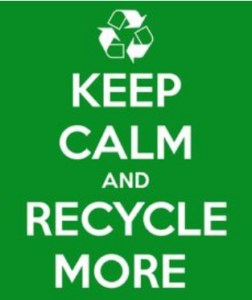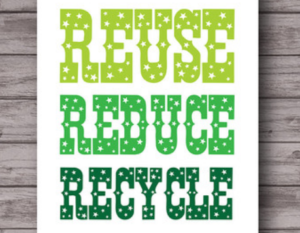Waste Reduction Is A Moral Obligation


Rep. Ellison Calls for Moral Drive on Zero Waste
Wrapping up the national Resource Recycling Conference in Minneapolis this week, US Representative Keith Ellison of Minnesota, called for taking a moral stand regarding climate change and consumerism by highlighting the benefits of Zero Waste.
With visions of a “Zero Waste society”, Ellison stated, “Our economy is structured around consumption. We need to restructure it around the benefits of society.” He also said, “You are working on what may be the most important thing for anyone to work on, which is saving this planet. I believe zero waste and recycling are an important way to do it.”
By introducing a $100 million recycling bill (H. R. 1034), Ellison is challenging the political will of Congress to fund the infrastructure necessary to create well-paying recycling jobs, which can boost economic vitality and prioritize sustainability.
Barnes Johnson, Director of the EPA’s Office of Resource Conservation and Recovery, was also in attendance at the conference. When asked about the current presidential administration’s track record on environmental concerns, he noted that Zero Waste is a concept and practice around resource efficiency and optimization that anyone can get behind. He assured the crowd of recycling professionals that the EPA will continue to stand for its core values around food waste reduction and sustainable materials management.
With businesses around the world heeding the call, Zero Waste is becoming a norm in operational efficiencies. Not only that, consumers are becoming more demanding of corporate responsibility in exchange for their loyalty and dollar.
To make it an official policy that municipalities and enterprises can more easily sign on to, it will now come down to the voters. In pushing this legislation for passage, citizens can hold public officials accountable for job growth through the new Zero Waste economy with the added benefits of cleaner air, land, and water.
http://www.wastedive.com/news/rep-keith-ellison-calls-for-a-zero-waste-revolution-and-industry-shake-up/503931/


August 28, 2017
With Natural Disasters Come Massive Wastes
Due to #HurricaneHarvey, Texas communities could face years of cleanup. While recovery will focus on immediate community repair, most cities do not have a plan in place to address the recycling and salvaging of valuable materials after a natural disaster.
From toxic chemicals and electronics to materials trashed from gutting homes and businesses for rebuilding efforts, the state’s landfills will be taxed with housing massive amounts of incoming wastes at the taxpayer’s expense.
Cities need a recovery plan for capturing useable discards that should not be landfilled. While this type of cleanup may not be a priority for some, it is a low-hanging fruit that could be used to reinvigorate local economies and put people back to work.
http://www.wastedive.com/news/texas-may-face-years-of-debris-cleanup-in-wake-of-hurricane-harvey/503677/


Photo credit: NewsUnited.com
July 27, 2017
Article: Austin to Continue Simple Recycling Program Despite Drop in Customers
Textile recycling is a big part of #ZeroWaste and much of that comes from clothing donations to local charities, but the City of #Austin has taken a different approach.
By contracting with Simple Recycling, local residents can now put textiles and home furnishings in special bags for curbside collection. Charities, such as Goodwill, have challenged this city contract and business model claiming their clothing donation stream has been affected.
Despite a major decrease in residential use of the Simple Recycling program since January, the City will continue the contract.
http://www.wastedive.com/news/austin-tx-to-continue-simple-recycling-program-despite-drop-in-customers/447921/


July 10, 2017
Republic’s Telling Infographic on the Hidden Costs of Waste
Republic Services, the well-known, international landfilling and recycling company, has just released a very telling infographic that highlights the costs of waste for businesses across the country.
Drawing from EPA and nonprofit studies, business owners are:
- Paying an average of $50 per ton to dump in landfills each year.
- Spending a combined $165 million in environmental & legal fees annually.
- Spending a combined 155 years in jail for environmental violations.
But innovative businesses are reaping the rewards of literally following the “3 R’s” of waste reduction, reuse, and recycling and experiencing cost savings:
- On the back end, businesses are prioritizing tighter inventory control so purchasing of unnecessary items is avoided. Also, identifying ways to reuse already purchased goods can give items like office supplies and furniture a 2nd or even 3rd life cycle.
- On the front end, businesses are understanding that it is imperative to “right-size” containers to maximize dumpster space and optimize the frequency of hauling pickups. It just doesn’t make sense to contract for peak services all year if a business can “right-size” a hauling contract and call for extra pickups during peak times of the year, like the holidays.
- It is estimated that recycling can be up to 40% less expensive than trash hauling, so it’s clear that taking a second look into business wastes and diverting as much recycling as possible can have a real effect on the bottom line.
- Also, many businesses are getting organics, such as excess food and landscape trimmings, out of their dumpsters. Through food purchase reductions, food donations to feed hungry people and animals in our communities, and/or composting organic wastes, business owners can free up about 40% of dumpster space for actual trash that cannot be recycled.
Over the past several decades, the green efforts of businesses and governments have spawned customers who are becoming keenly aware of and demand sustainable practices. Based on the report, 60% of consumers are more likely to shop at companies that have a strong environmental track record.
With multiple ways to save money and increase customer loyalty, why would any business continue to trash highly valuable discards that create jobs and boost local economies?


June 5, 2017
Changes May Come to Austin’s Construction/Demolition Recycling Ordinance
On Wednesday, May 31st the City of Austin Resource Recovery Department (ARR) called a working group meeting of the Zero Waste Advisory Commission (ZWAC) to address issues around the city’s Construction & Demolition (C & D) ordinance and Administrative Rules.
Present were local haulers and processors to provide expertise and insights to the working group members about having to meet ordinance requirements, but perceiving to not have ample opportunity to do so. And, being positioned between a city ordinance that mandates at least 50% recycling at construction, demolition, and renovation sites of 5,000 sq. ft. or more and not having many opportunities to rid a site of the discards properly leaves haulers and General Contractors facing non-compliance.
One of the issues is that some processors won’t take C & D materials from 3rd party haulers because of contamination, which affects the quality of the streams and lowers the value of the debris. Some processors have professional agreements with only 2 or 3 trusted haulers that ensure streams are kept clean and capacity constraints don’t arise.
Another issue is that sites that are seeking LEED certification are allowed through those standards to incinerate some materials that cannot be redirected through reuse and recycling and call it diversion instead of disposal. But, the international definition of Zero Waste and the City of Austin Zero Waste Strategic Plan calls for no burning of wastes and labels any burning as disposal, not a diversion.
These standards are at odds with each other in addressing the highest and best use of materials and the haulers and processors could pay the price if the language in the local policy is not addressed.
ARR will call another ZWAC working group meeting soon to get more stakeholders to the table. The city is especially seeking General Contractors who can bring expertise in managing C & D projects and having to comply with the diversion requirements.


May 24, 2017
Texas Legislative Overreach Thwarted on Local Pollution Prevention Rights
VICTORY!!!! A controversial bill was killed in the #Texas Legislature that would have removed the rights of local governments to prevent pollution, such as single-use plastic bags. Sixteen municipalities have single-use bag ordinances, including coastal, rural, and suburban areas.
Not only did an unlikely band of allies come together, including ranchers, small business owners, technical experts, and environmentalists, to demonstrate both economic and ecological concerns to state lawmakers, they did so to help local governments maintain local control of local tax dollars addressing local pollution issues.
Robin Schneider of Texas Campaign for the Environment stated, “The public hearing on SB 103 made clear to state lawmakers that this issue is not about environmentalists versus business, but rather a few business lobbyists versus costly and damaging pollution.”
http://www.bizjournals.com/austin/news/2017/05/23/austins-plastic-bag-ban-can-stay-measure-dies-in.html


April 3, 2017
Austin’s Capital Kitchens Uses City Rebate to Boost Clients’ Waste Diversion!
Over the past couple of months, our team has been working with Capital Kitchens to not only expand their current recycling program but to implement a new composting program!
Using the City of #Austin‘s $1,800 business rebate, the commercial kitchen is now able to offer its 30+ clients, consisting of caterers, food truck owners, chocolatiers, and others, the opportunity to lessen their environmental impacts through waste diversion from landfills!
We provided a comprehensive onboarding process through education training and revised the company’s contract language to reflect client agreements with the new policies. The program was well received and the clients of Capital Kitchens are excited to now claim #ZeroWaste operations and establish a green marketing edge over their competitors!
Big thanks to Capital Kitchens owner, Trish Foreman Wesevich, for her long-term vision for sustainability and to ZWS Associate Morgan Whitney for her tireless efforts in helping businesses discover operational efficiencies.
Capital Kitchens owner, Trish Wesevich, makes the site’s new composting program official!
